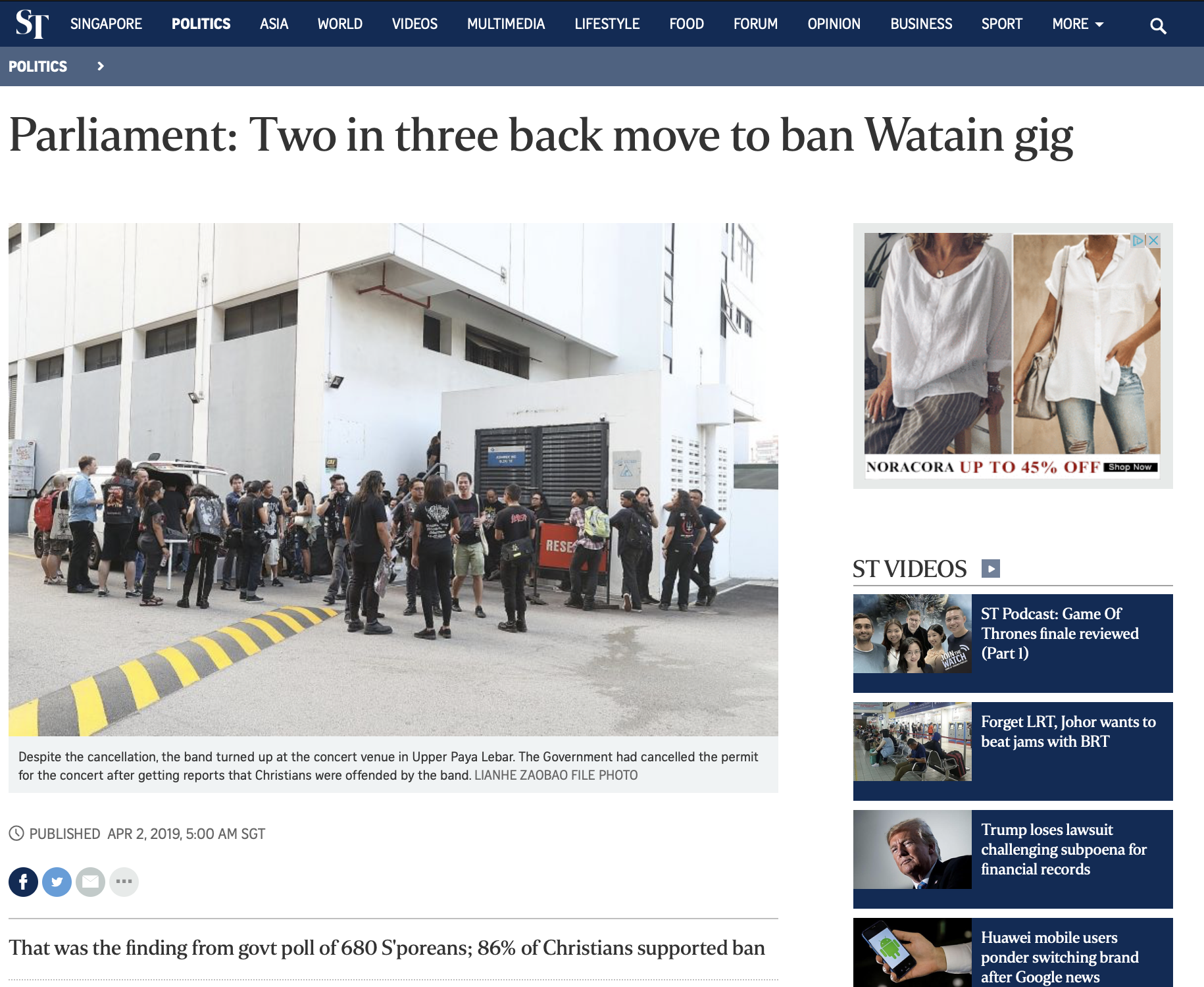4.1 Support for the Watain ban
Swedish black metal band Watain was supposed to perform in Singapore on 7 March 2019. However, the gig was cancelled just hours before it was scheduled to begin, with the government citing concerns from the Christian community14. To evaluate public sentiment towards this incident, REACH15 conducted a poll with 680 Singaporeans aged 15 and above. Of interest here is how results from this poll was represented in public discourse.
Our assessment of public sentiment turned out to be correct, because a subsequent REACH survey showed that, first of all, that 60% were aware of the cancellation. Of those who were aware, 86% of Christians agreed with the cancellation. That I think will be natural. But 64% of all who had heard about the cancellation, Christian and non-Christian, also agreed with the cancellation. Twenty-eight percent thought that it should not have been cancelled.
Minister for Home Affairs K Shanmugam, 1 April 2019, emphasis mine
The quote above is taken directly from the Hansard, and is consistent with the results shown in REACH’s press release. Note the phrases that I bolded for our purposes, which I will call “qualifiers”.

Figure 4.1: Screenshot of online article on results from REACH poll. Retrieved May 21, 2019.
The next day, national newspaper The Straits Times ran a story headlined “Parliament: Two in three back move to ban Watain gig”. Within the text of the article, it reads:
The Government decided to cancel the permit for Watain’s concert last month when it received reports that mainstream Christians were very concerned and offended by the band, Home Affairs Minister K. Shanmugam said yesterday. And a survey of Singaporeans by government feedback unit Reach found that two in three supported the move, he noted. Among Christians, 86 per cent were supportive of the move to disallow the concert, the Reach poll found.
Note the qualifier “among those who were aware” is neither in the headline (Figure 4.1) nor the body of the article16. Why is this important? Results from REACH show that 63% of respondents were aware, and out of these respondents, 64% supported the government’s ban. This means that out of all respondents to the survey, only about 40% reported supporting the ban. The qualifying phrase “among those who were aware” meaningfully changes the interpretation of the results - we shouldn’t be able to say that the majority of Singaporeans supported the ban when in fact only 40% of the survey respondents did so.
In effect, the Straits Times article is invoking a strong assumption here (see 4.3 for a more technical explanation) - that if those who were unaware were in fact able to express their support for the ban, the same proportion of respondents (among those who were aware, 64%) would also support the ban. But being aware of the ban is a prerequisite for support of the ban, which makes this assumption rather unreasonable. Even assuming this hypothetical scenario were possible, the actual figure could be higher or lower - it depends on how similar (or different) the unaware are to the aware. Those who were not aware may be less likely to care about black metal music (or simply too busy to keep up with current affairs) and simply base their support of the ban on their general sentiment toward government policies. This seemingly minor omission of the qualifier can lead to false conclusions pretty quickly. Let us look at another example.
See https://www.channelnewsasia.com/news/singapore/watain-concert-cancelled-christian-community-reaction-shanmugam-11399434↩︎
The Singapore Government’s feedback unit↩︎
CNA ran a similar headline, but included the qualifier within the article. See https://www.channelnewsasia.com/news/singapore/2-in-3-singaporeans-in-reach-poll-supported-government-s-11401066↩︎